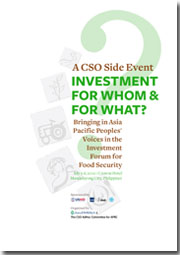Rationale
The two-day preparatory CSO meeting aims to organize the meaningful engagement of CSOs at the joint ADB/FAO/IFAD Investment Forum for Food Security in Asia and the Pacific (Manila, 7 to 9 July 2010). It is an important follow-through activity of the Ad Hoc Committee organized last February 24-25, 2010 in Manila during the
Regional Consultation on Food Security in Asia and the Pacific Region sponsored by FAO and co-hosted by
AsiaDHRRA. The said consultation brought together various Civil Society Organizations (CSOs) representing regional formations of rural sectors – namely, farmers, fishers, indigenous peoples, women, youth, cooperative, NGOs, and INGOs to review and agree on thematic priorities affecting food security in the region and respond to the need to broaden and strengthen ranks among them towards a stronger movement for respon
ding to hunger and poverty among the marginalized sectors. The CSOs decided to form the regional Ad Hoc Committee (AHC) to anchor the planning process focusing on agreed regional priorities for the next two years, and accordingly craft a concrete plan of action that considers upcoming major regional events such as the Investment Conference on Food Security in Manila on July, the 30th FAO-APRC Meeting in Korea in September, and other processes including the reform process of the Committee on World Food Security (CFS) in Rome, 12 to 16 October 20
10.
The Investment Forum on Food Security is an important event for various regional platforms and initiatives where the voices of the grassroots particularly the small-scale producers, indigenous peoples, fishers, rural women and youth can be heard by intergovernmental bodies like ADB, FAO and IFAD whose investment policies and programs greatly affect the lives of rural people. It is imperative that the perspectives of the rural sectors, based on learnings and insights from the banks' programs and policies, are factored in the new strategies for advancing food security at the national, regional and global levels.
An event planned for by the AHC, its members recognize the funding support received from the USAID, ADB, FAO and IFAD.
Objectives Outputs Outcomes
Specifically, the CSO Meeting aims to achieve the following:
- CSOs have better understanding of the existing policy frameworks and thrust of ADB, IFAD, and FAO on investment in food security in aid of their various policy advocacy roles in the region.
- Common CSO agenda identified and concrete investment policy proposals and program recommendations developed relative to the Investment Forum for Food Security
- Firmed up Asia-Pacific regional CSO medium-term agenda in relation to engaging various regional and international intergovernmental bodies working on food security/food sovereignty and sustainable rural development
- Improved coordination among regional CSO partnership mechanisms especially in relation to upcoming key regional and international events beyond the Investment Forum, e.g. 30th FAO APRC in the Republic of Korea and CFS processes in Rome.
The expected outputs of the CSO preparatory meeting are as follows:
- Analysis of ADB/FAO/IFAD principles and investment thrust on food security
- Common CSO statement highlighting the views and recommendations of CSOs, especially of the grassroots sectors, on Investments for Food Security
- Concrete policies proposals and project investment calls responsive to the needs of most vulnerable and affected sectors
- Finalized medium term CSO agenda for food and agricultural governance in the region
- Clear plan of action for CSO participation during the 30th APRC in Korea in September 2010
It is envisioned that the 2-day preparatory meeting will inspire and lead to a more effective policy engagement during the Investment Forum resulting from improved analysis by the CSOs' of ADB/FAO/IFAD principles and investment thrusts on food security, manifested by their coherent proposals for policy reforms and specific concrete calls for investment on food security in Asia and Pacific region.
A collective voice among CSOs will also signal the seriousness of the sector to make ADB, IFAD, and FAO and their development partners more accountable of their policies and programming towards the agenda of a food secure region and reduced poverty in the rural areas.
III. Participants and Organizers
The participants of the CSO Side Event include the members of the regional Ad Hoc Committee and the Korean CSO Working Committee for the FAO-APRC, the IFAD Medium Term Cooperation Programme Steering Committee Members from China and the Southeast, and CSOs from the region who registered for the Investment Forum.
A volunteer working group from among the AHC members supports the preparation of the program design and content. A Steering Committee from among the participants shall be created to help direct the CSO side event proper and to prepare the final conclusion and statement from the meeting which will be presented during the Investment Forum. AsiaDHRRA, as AHC focal point, provides the secretariat and coordination support to the event and coordinates with FAO who acts as CSO liaison for the Investment Forum organizers.
Download the program here....
Read more...

